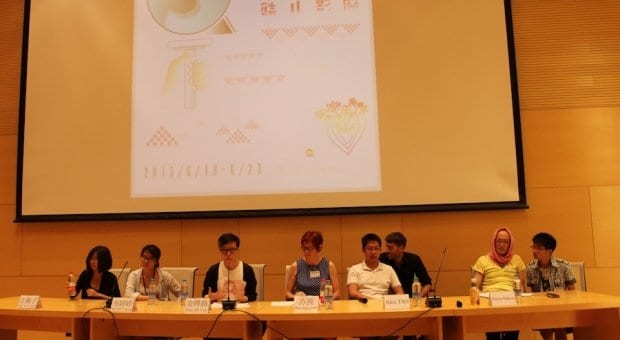
"Bisexual Revolution!" panel debate. From left, Wang Meizi, Wei Tingting, Jin Yelu, Susie Jolly, Alex Tso, Stijn Deklerck, Hibino Makoto, Zhu Ning Credit: Beijing Queer Film Festival
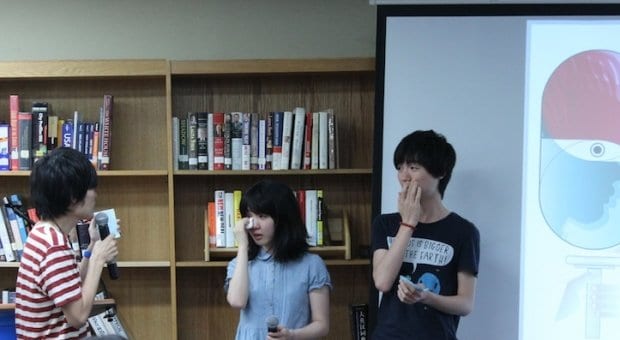
Japanese director Inoue Kana at the screening of her intersex-themed film "I don't care" Credit: Beijing Queer Film Festival
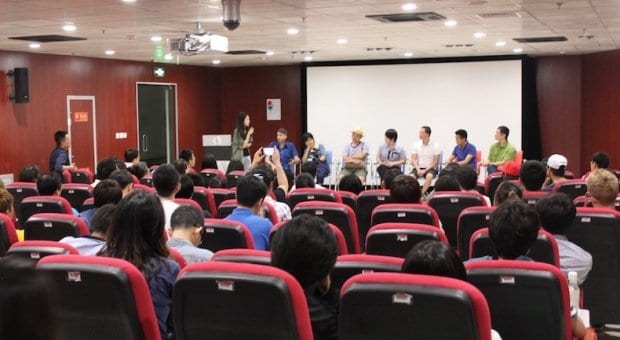
Screening mainland China, Macau and Hong Kong documentaries at Tsingying Film Credit: Beijing Queer Film Festival
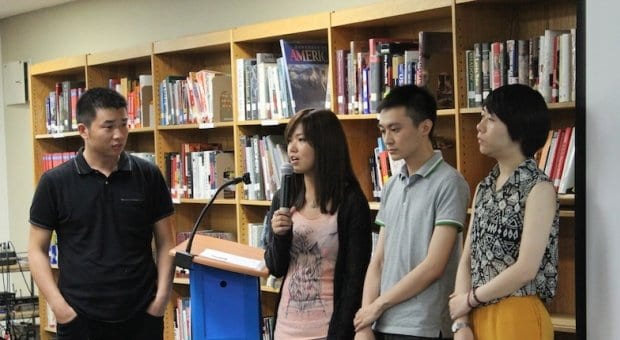
Mainland Chinese short films screening. From left, festival director Fan Popo, directors Jenny Man Wu and Zhu Cheng Credit: Beijing Queer Film Festival
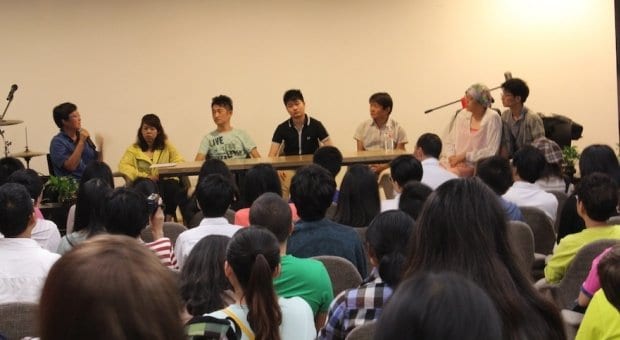
Panel debate "At the Margins of the LGBT Movement." From left, He Xiaopei, Yaoyao, Bing, Tony, Qiu Aizhi, Hibino Makoto, and Zhu Ning Credit: Beijing Queer Film Festival
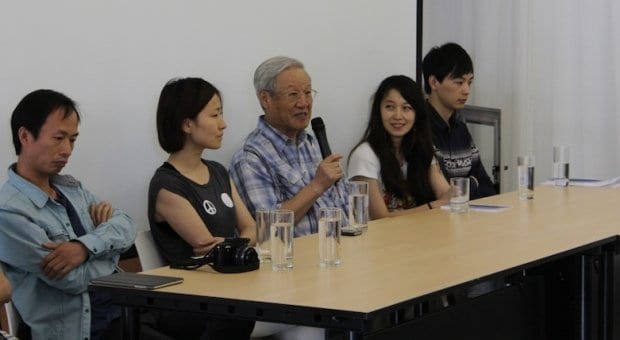
Panel debate "Film Censorship in China." From left, Zhu Rikun, Wu Shan, Xie Fei, Yang Yang, and Yang Cheng Credit: Beijing Queer Film Festival
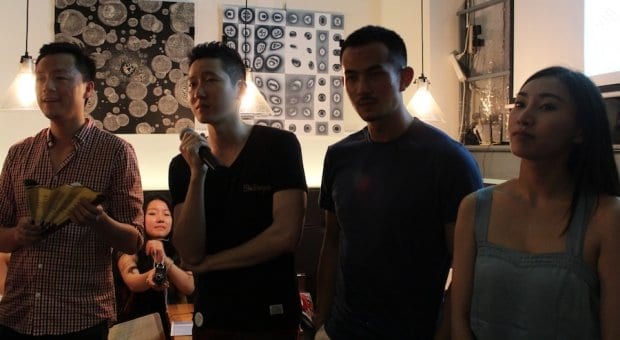
Q&A after the opening film Graupel Poetry. From left, festival committee member Xiaogang Wei, director Bruce Saxway, actors Yang Junyu and Zhao Shumei Credit: Beijing Queer Film Festival
The following report was written by members of the Beijing Queer Film Festival organizing committee. Daily Xtra is pleased to share their news and views on the festival’s success.
A small courtyard café near Andingmen, Beijing, is packed to the brim with a colourful bunch of people who have all come to witness the closing ceremony of the sixth Beijing Queer Film Festival. In its 13-year-long history, this is the first time the tenacious festival held its events in the centre of Beijing without incurring any government interference.
The Beijing Queer Film Festival was launched in 2001. Since then, it has weathered many a storm to become a major platform for exchange & reflection about queer film in China. The first edition was shut down on the last festival day, the second edition was forced to move from Peking University to the Contemporary Art District 798, and the authorities directly forced the organizers to cancel the fifth edition before it even started. These actions of the authorities speak volumes about their attitude towards freedom of speech.
In China, independent film festivals have always been closely watched by the police, yet since August last year the situation has become particularly worrying: a large number of festivals, including the Beijing Independent Film Festival and the China Independent Film Festival, were successively called to a halt.
The Beijing Queer Film Festival organization committee, composed of 7 members with various backgrounds, faced a lot of obstacles. Almost half of their meetings were spent talking about security issues, as the government interference with the festival’s fifth edition was still fresh on their minds.
When the fifth edition was forcibly cancelled, they found a way of letting it run its course by adopting a guerrilla-style of organizing, addressing numerous small places in Beijing for separate screenings and avoiding any visible publicity. They decided to continue using this tactic for the sixth festival edition, holding their events at different cafés, queer-friendly bars, film-fan salons and even on a moving bus. Separate screening events were also held at the French and the Dutch Embassy, and at the Beijing American Center.
Avoiding publicity, an anomaly in the film festival world, formed part of the guerrilla tactics. The Beijing Queer Film Festival didn’t publish anything about its sixth edition on its official website and blogs, and the audience was explicitly asked not to spread any news or reports before or during the festival. At the closing ceremony, festival chairman on duty Fan Popo said: “I’m glad to say that now you can finally recount all of your festival experiences on your Weibo accounts.”
All festival events, which took place from June 19-23, were advertised as separate queer film events, without mention of the involvement of the film festival. But to the attentive eye, it was clear to see that the sudden surge of independent queer film events could only mean that the Beijing Queer Film Festival was in town. Through word-of-mouth, the festival gathered a full house at nearly all of its screenings, and only the occasional attendee was surprised to notice that the Beijing Queer Film Festival was behind the different queer film activities.
Besides from these precautionary measures, the organizers prepared for the interference of the authorities, making sure they had a Plan B and even a Plan C and D to continue the festival events after official intervention. Yet, to the amazement and even disbelief of the organizers, the precautionary measures proved enough and the festival ran its course unharmed.
The festival continued its scholarship program, started in 2011. Among more than 60 applicants, 25 people coming from less-developed parts of China obtained funding to attend the festival. They gladly embraced the opportunity to watch and discuss queer-themed films, an unknown luxury in their respective hometowns.
During the five days of the festival, 28 films were screened from nine different countries. The festival presented a state-of-the-art of Chinese queer film, showcasing recent films from Mainland China, Hong Kong, Macau and Taiwan. It was interesting to see that a lot of them were produced by young people and/or students. Choi Lan Sin (Macau) was one of the young directors participating in the festival and presented her film “I’m Here”, one of the first documentaries to address the LGBT community in Macau: “This opportunity gave me more understanding about the queer world, and also taught me a lot about the progress of the rights movement in different countries.”
This year’s festival had a special focus on Japan. Genya Fukunaga (Kansai Queer Film Festival) curated a program of four very different queer Japanese films. Inoue Kana, director of “I don’t care”, burst out in tears after the screening of her intersex-themed film. Her film had met with a lot of critique and misunderstanding in Japan, and she was thoroughly moved by the fact that the Chinese audience received her film so well.
The program “Did you see me?” focused on communities whose voice is seldom heard within the current LGBT movement. It screened several related films, and held two panel sessions which focused on bisexuality, asexuality, intersex, transgender, sex work, sadomasochism and other topics seldom discussed within China’s queer movement.
The festival also held a much anticipated debate on censorship in China, which saw the participation of famous director Xie Fei. He expressed that in China, the issue of film censorship is closely linked to the current contradictions existing within the government structure. To the question whether and when the current censorship system would be abolished or changed, neither he nor any of the panel guests had an answer, and none of them were very optimistic about the future.
At the closing ceremony, organization committee member and festival co-founder Cui Zi’En announced the co-chairmen of the festival’s seventh edition, Wei Xiaogang and Stijn Deklerck. Wei Xiaogang expressed that, while this year’s festival was a great success, it’s questionable whether its format could be used again for the seventh edition which will take place in 2015. “A lot can change within two years. The only thing that’s certain is that we need to continue to fight to obtain greater freedom of expression.”
Visit the group’s website at bjqff.com.
For more information, email info@bjqff.com.
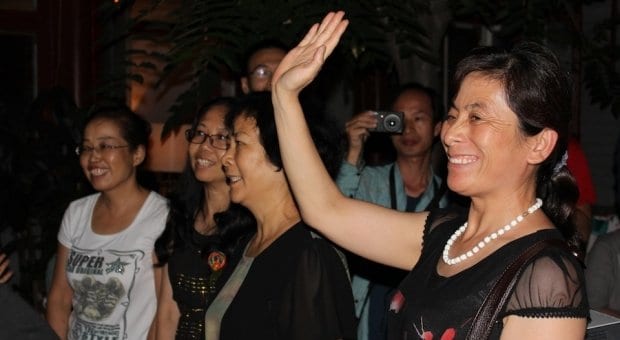
 Why you can trust Xtra
Why you can trust Xtra


